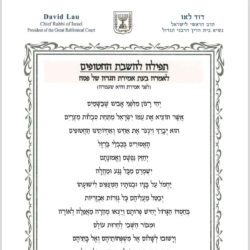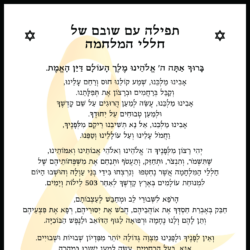| Source (Hebrew) | Translation (English) |
|---|---|
יְהִי רָצוֹן מִלִּפְנֵי אָבִינוּ שֶׁבַּשָּׁמַיִם אֲשֶׁר הוֹצִיא אֶת עַמּוֹ יִשְׂרָאֵל מִתַּחַת סִבְלוֹת מִצְרַיִם הוּא יְבָרֵךְ וְיִנְצֹר אֶת אַחֵינוּ וְאַחְיוֹתֵינוּ הַחֲטוּפִים הָאֲסוּרִים בְּכַבְלֵי בַּרְזֶל, יְחַזֵּק נַפְשָׁם וֶאֱמוּנָתָם, יִשְׁמְרֵם מִכָּל נֶגַע וּמַחֲלָה, יַחְמֹל עַל בָּנָיו וּבְנוֹתָיו הַמְּצַפִּים לִישׁוּעָתוֹ, יְבַטֵּל מֵעֲלֵיהֶם כָּל גְּזֵרוֹת אַכְזָרִיּוֹת. |
May it be the will of our Father in Heaven Who brought His people Israel out from the suffering of Egypt that He bless and save our abducted brothers and sisters, bound with iron chains. May He strengthen their souls and faith, Protect them from all harm and disease, Have mercy on His sons and daughters awaiting His salvation, Nullify all cruel decrees from upon them. |
בְּחַסְדּוֹ הַגָּדוֹל יָחִישׁ פְּדוּתָם וְיֵצְאוּ מְהֵרָה מֵאֲפֵלָה לְאוֹרָה וּמִבּוֹר הַשְּׁבִי לְחֵרוּת עוֹלָם וְיָשׁוּבוּ לְשָׁלוֹם אֶל מִשְׁפְּחוֹתֵיהֶם וְאֶל בָּתֵּיהֶם. |
In His great kindness, may He hasten their redemption and may they quickly emerge from darkness to light, and from the pit of captivity to the freedom of the world, and return in peace to their families and to their homes. |
אָנָּא, נֶטַע אַחֲוָה שָׁלוֹם וְרֵעוּת בְּלֵב כֻּלָּם, הָסֵר קִנְאָה וְשִׂנְאַת חִנָּם וּפְרֹס עָלֵינוּ סֻכַּת שְׁלוֹמֶךָ וְנִזְכֶּה בְּקָרוֹב לוֹמַר לְפָנֶיךָ שִׁירָה חֲדָשָׁה. |
Please, plant brotherhood, peace and friendship in the hearts of all, Remove envy and baseless hatred and spread over us the Sukkah of Your peace, And may we merit to soon sing before You a ‘New Song.’[1] The shir ḥadash or shirah ḥadashah (“new song”) is a motif found in numerous psalms and in Isaiah 42:10. In rabbinic Judaism the motif has a powerful messianic resonance, signifying liberation, the end of the Galut, and the realization of a new messianic age. The phrase is invoked at the opening of the first portion of Hallel (Psalms 113 and 114) in the Maggid section of the Passover seder haggadah as well as at the very end of the formula of the second blessing over the wine (concluding Maggid). –ANV |
This prayer for the well-being of the captives taken hostage by ḤAMA”S and its allies on 7 October 2023 was written by the Ashkenazi chief rabbi of the State of Israel, David Lau, and shared by his office in the month preceding Pesaḥ 2024. The text of the prayer transcribed is that as posted at Arutz Sheva on 7 April 2024. The translation in English was made by Rabbi Shimshon Nadel as disseminated over Facebook on 8 April 2024. Many thanks to Abraham Katz for bringing the prayer to our attention. He notes the prayer is intended to be read at the Passover seder in the Maggid section before והיא שעמדה (v’hi she’amda).
Source(s)
Notes
| 1 | The shir ḥadash or shirah ḥadashah (“new song”) is a motif found in numerous psalms and in Isaiah 42:10. In rabbinic Judaism the motif has a powerful messianic resonance, signifying liberation, the end of the Galut, and the realization of a new messianic age. The phrase is invoked at the opening of the first portion of Hallel (Psalms 113 and 114) in the Maggid section of the Passover seder haggadah as well as at the very end of the formula of the second blessing over the wine (concluding Maggid). –ANV |
|---|

“תְּפִלָּה לַהֲשָׁבַת הַחֲטוּפִים | Prayer for the Return of the Captives, by Rabbi David Lau (Office of the Ashkenazi Chief Rabbi of Israel 2024)” is shared through the Open Siddur Project with a Creative Commons Attribution-ShareAlike 4.0 International copyleft license.











Leave a Reply